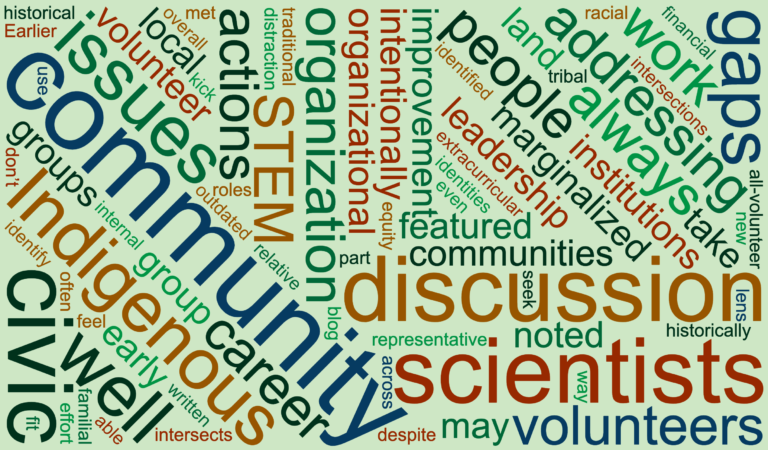Est. Reading Time: 3 minutes
Share this with your network
Earlier this year, ESAL’s Steering Committee met to discuss how well we are addressing matters of justice, equity, diversity, and inclusion (JEDI) in our work as well as in our organization. While civic and community engagement is often treated as extracurricular, or even a distraction, by traditional STEM institutions; ESAL has always sought to recognize its importance to a successful STEM career. In doing so, ESAL has organically featured and attracted a diverse group of engineers and scientists who don’t always fit narrow and increasingly outdated stereotypes of scientists and engineers. Nevertheless, we know that there is always room for improvement and that without addressing JEDI intentionally, our efforts will remain incomplete.
To kick off this effort, each member of the Steering Committee shared their thoughts on what works well, what needs improvement, and what further actions we could take at ESAL to address JEDI. As a group, we drafted a statement that summarizes ESAL’s commitment to JEDI. I synthesized the output of the Steering Committee’s discussion and shared it with all of ESAL’s volunteers, who helped further refine our statement and plan. Below is a summary of our discussion.
What’s working?
- What we do - ESAL volunteers agreed that the engineers and scientists we have written about in our blog or have hosted as speakers for our events have diverse backgrounds and identities. In particular, we are proud that we have featured the work of so many students and early career scientists and engineers. We are also proud that we have frequently addressed issues at the intersection of JEDI and STEM.
- Who we are - As an organization, we feel that we have stronger representation by women, including in leadership roles, than the overall STEM community. We also have volunteer representation across a breadth of STEM disciplines as well as strong representation by students and people in early career stages.
Where are there gaps or concerns?
- What we do - Despite being an organization based in the United States, ESAL has not highlighted the way the STEM community intersects with Indigenous science, Indigenous communities, and tribal governments, particularly given the U.S.’s history of land seizure and its connection to institutions of higher education. Our discussion also noted that ESAL’s communications platforms and digital-heavy approaches may not be accessible to all engineers and scientists, particularly those who are more senior.
- Who we are - ESAL’s leadership and volunteer teams are not representative of the broad demographics of the U.S., and we also have some representation gaps relative to the U.S. STEM community. These gaps are most notable with respect to racial and ethnic groups that are traditionally marginalized. For example, ESAL does not have any volunteers who identify as Black or as Indigenous. As part of our discussion we also noted that, despite its benefits for enabling us to quickly onboard new, part-time contributors, our all-volunteer organizational structure may also prevent people who have familial financial obligations from being able to commit to volunteering with ESAL.
What actions will ESAL take?
- Proactively conduct outreach and seek partnership opportunities with scientific societies and organizations for groups that have been historically marginalized in STEM.
- Incorporate discussion of JEDI issues in STEM into all of ESAL’s programming.
- Continue to use a JEDI lens for our issue-focused programming and content.
- Conduct a quantitative internal review of ESAL’s organizational diversity.
- Through our programming and content, highlight the historical and current intersections between Indigenous people and the mainstream U.S. STEM community, without shying away from controversy, particularly with respect to local ecosystem and land rights issues.
We recognize that our proposed actions will not address all of the gaps we have identified in our work, but we hope that they will start us on a journey to more intentionally addressing the issues of JEDI in our local communities and within the STEM community itself.
